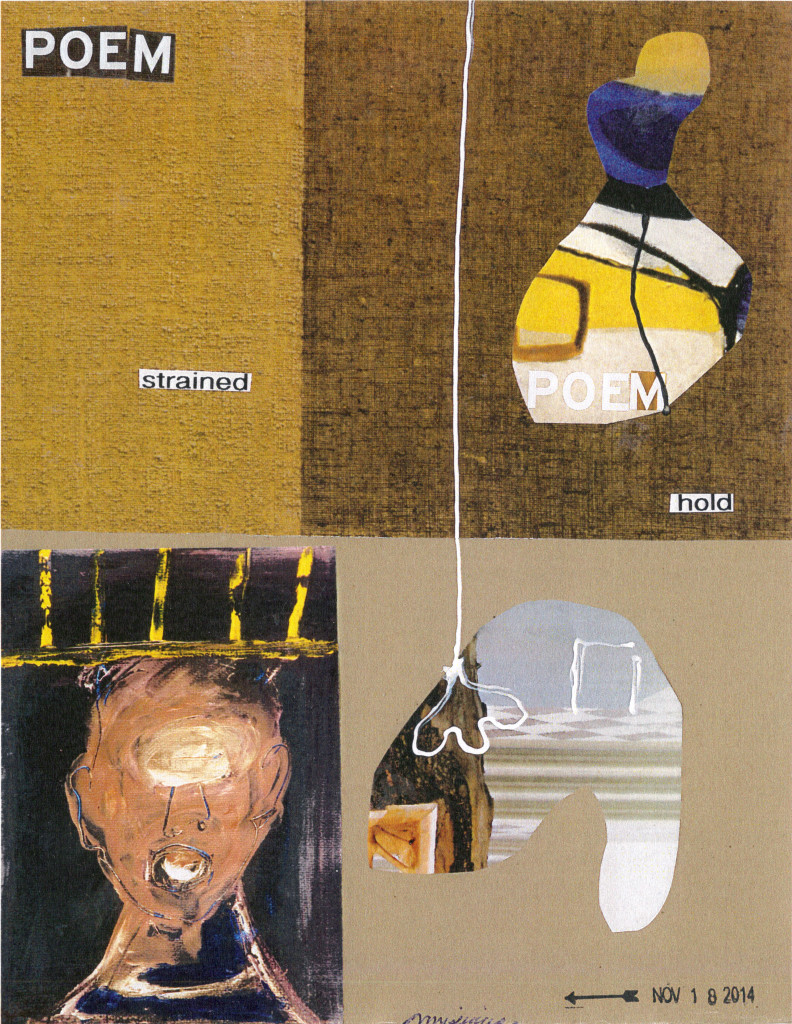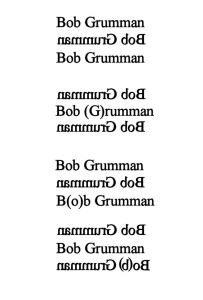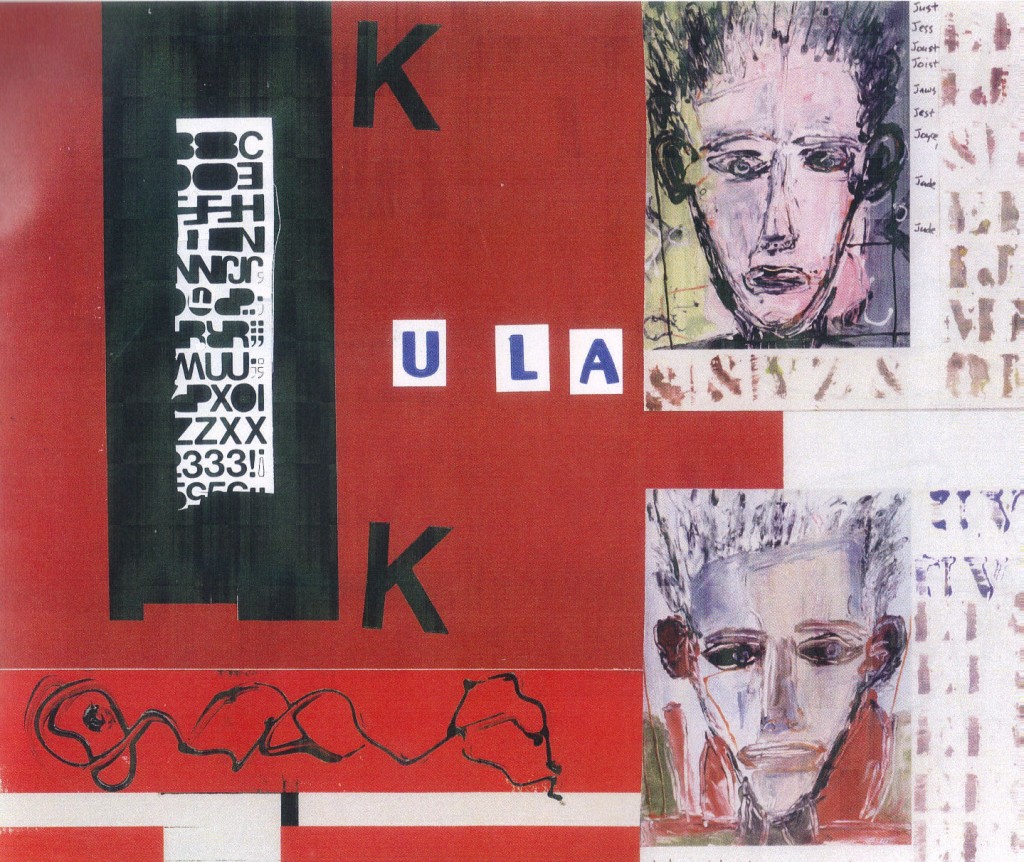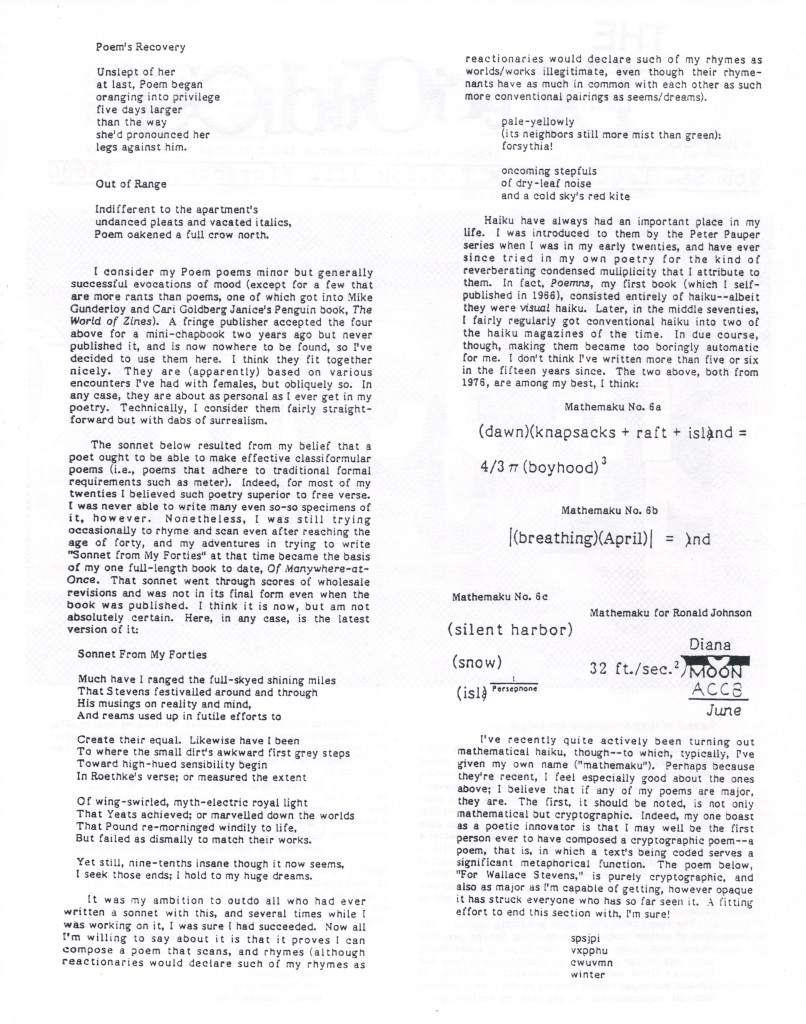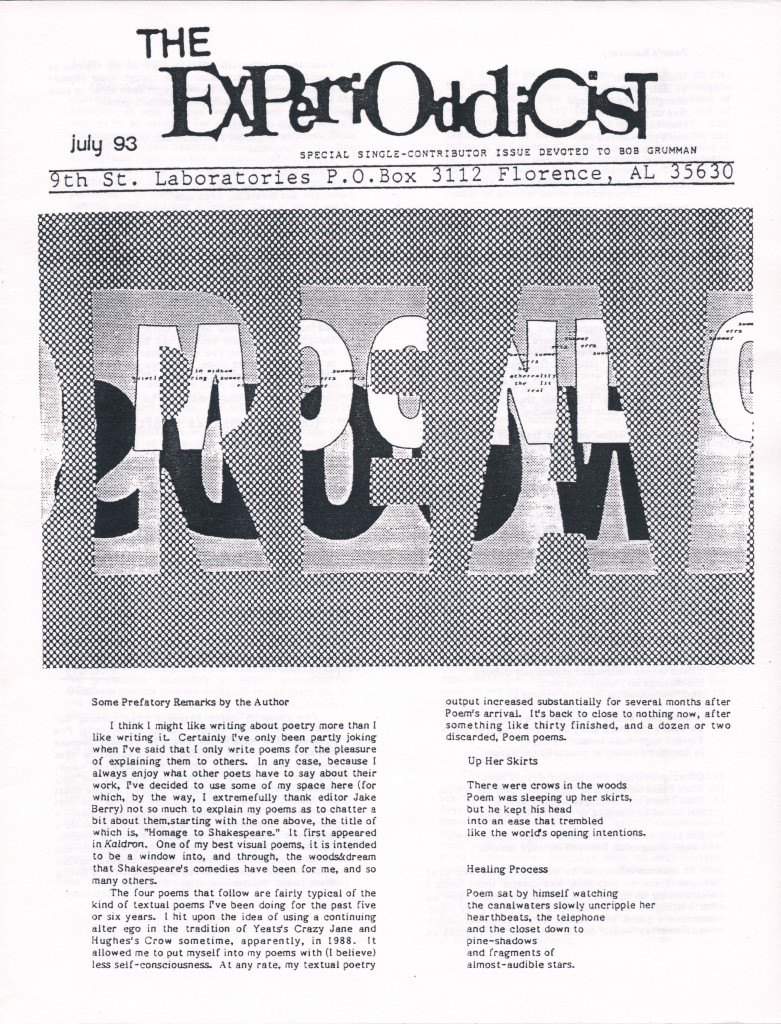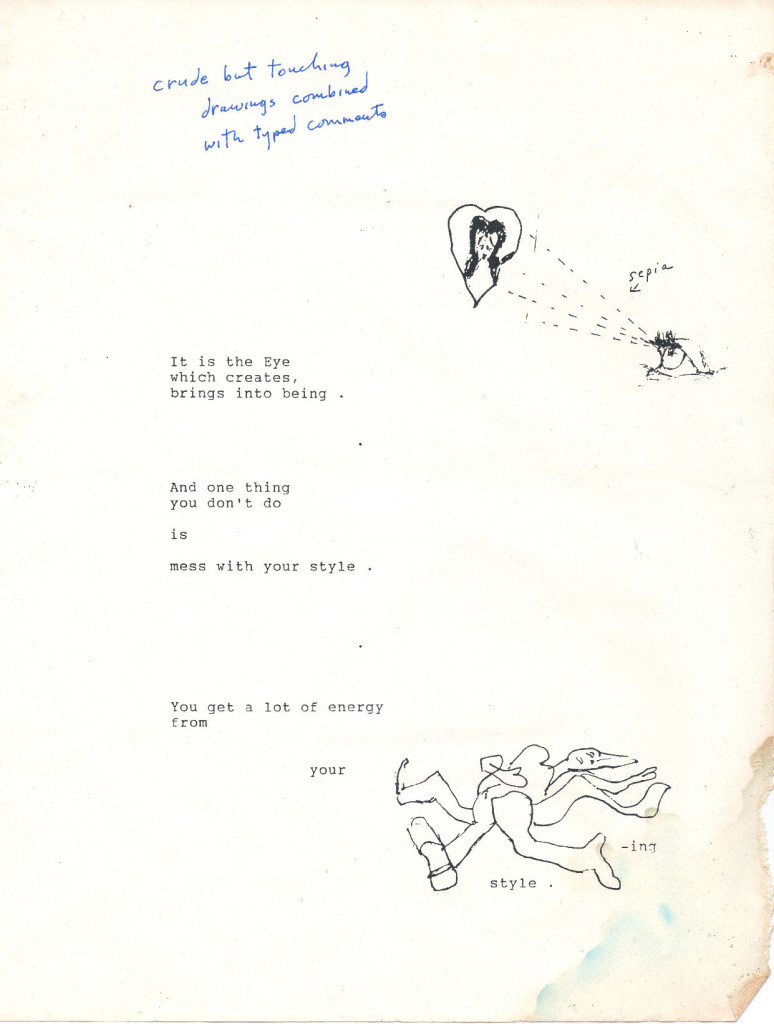Archive for the ‘Kinds of Poetry’ Category
Entry 1753 — My 1st Full-Scale Hero in Poetry
Sunday, March 15th, 2015
In my little-selling Of Manywhere-at-Once, Keats was one of the six canonized poets I wrote a chapter about. Yeats, Pound, Stevens, Cummings and Roethke were the others. I suddenly realize that Stevens was the last of them to become a hero in poetry of mine–around 35 years ago. None since. Nor, that I can think of, any literary heroes of any kind since then. Heroes of verosophy? Perhaps. More likely, no: because I don’t think I have any genuine verosophical heroes. The one who comes closest is Nietzsche, but I consider him a literary hero. I’ve greatly admired a lot of verosophers–Archimedes, Aristotle, Darwin, Newton, Dalton, Faraday, to mention a few–but not the way I’ve idolized and drenched myself in the works and lives of writers like Keats. And a number of visimagists like Cezanne and Klee. But no composers. I guess the reason for this is obvious: I’ve become a writer, and (to a degree) a visimagist, but not a composer. I consider myself a verosopher, but one unlike any I’m familiar with, except–possibly–Pierce.
It may be that I’ve had no cultural heroes since my thirties due to some flaw of mine, but I suspect one grows . . . not beyond, but off to the sides, of hero-worship. Into too much of one’s own work toward becoming a cultural hero oneself to have as much time new ones. One also will eventually have a number of contemporaries to take the place of heroes, albeit differently–as co-heroes rather than as worship-worthies.
In any case, in my chapter about Keats, I spent over four pages on his sonnet to Chapman’s Homer, which was one of the few poems I’d memorized by then (around the age of 18)–and, for that matter, one of the few I have ever memorized. I wish I’d memorized many more, but I also wish I knew more than one language. I tend to think I’ve stored all the data I’ve been capable of (as has everyone), so it doesn’t bother me inordinately. Just a little wishfulness that a few things were not impossible. Except when I’m in my null zone and realize that nothing really good is possible.
I only memorized one other poem by Keats (also at around the age of 18):
When I have fears that I may cease to be Before my pen hath glean'd my teeming brain, Before high-piled books, in charactry, Hold like rich garners the full-ripen'd grain; When I behold upon the night's starr'd face, Hugh cloudy symbols of a high romance, And think that I may never live to trace Their shadows, with the magic hand of chance; And when I fear, fair creature of an hour, That I may never look upon thee more, Never have relish in the faery power Of unreflecting love!--then on the shore Of this wide world I stand alone and think Till Love and Fame to nothingness do sink.
Note Keats’s glorification of “high-piled books” here and another poet’s accomplishment in the Chapman poem–his raw young poetic ambitions as a young man obvious, so just the thing to capture me at 18–besides the level of the writing. Although poetry was never at the center of my writing ambitions until the past decade or so, by default.
(Aside: after going through my edition of Keats’s poems to make sure I remember the poem above correctly–actually to fix parts I knew I hadn’t–the level of his writing bothered me: in less than 26 years he composed more effective poems than I have in almost 75. This is not false humility. But I feel I have added to the poet’s tool-kit, which he did not, and ranged beyond poetry into a theory pf psychology, which he did not, and which I think beyond doubt an accomplishment of sorts. Yes, competitiveness is an enduring part of my character. I still consider more a virtue than not.)
Okay, back to my dictum about reading poetry to the extent that you devour everything you can of the life and work of at least one of them as I devoured Keats. This resulted in several (but not a flood) of defective poems until I wrote the following in my twenties:
I yearn to run madly into the brush till a wild complexity of chance-created life has cut me off from mortals' petty strife I long to be where swift winds fill with the joyful fundamental music of woods & a gloriously unsymmetrified uproar of grass and violets and weeds and rocks covers every open field and curving hill. I long to stand at the sweet dense core of nature studying the clouds' slow schemes till the regulated world has blurred into nothingness & I am in leagues with dreams..
This is a fair derivative poem, I now think, but indicative only that when I wrote it, I had reached the basement of the poet’s vocation–thanks to all the reading I did. I’m afraid I have to admit that this lesson of mine isn’t much of a lesson, for if you need someone urging you to read poems and writings about poets before you’ll do it, all the reading you do will be a waste of time for you. I did the reading I did because I had to. and I had made a hero of Keats I had to find out as much as possible about, because of my genes, which made me search for a hero, then in effect become a sort of apprentice of his. The real lesson is that you should save time by dropping the idea of becoming a poet if you aren’t already automatically doing this. I suppose a minor implicit value of the lesson is to confirm you in your vocation if you have found your Keats–and encourage you to keep going if you have not, but are deeply involved with some kind of poetry.
.
Entry 1752 — Break-Time
Saturday, March 14th, 2015
I was hoping to continue my lesson with an entry as good as I feel my one yesterday (mostly) was, but got involved in a duel of interpretations of Shakespeare’s Sonnet 24 with Paul Crowley at HLAS. I still was planning to come here and work up a storm but Shirley took care of that. Just as I finished my post for Paul and was about to cut&paste a copy of it in the flash drive I use for things like it, she hopped up on my computer desk, casually walked across my keyboard, then hit the floor again and walked out of the room. In the process, she deleted everything in my post. So I have to do it all over again. I need to because I feel I said a few good things about the poem–and several important things about my discussion of it, which I first called an “explication” but which was not quite that, but–I eventually concluded–the beginning of what I call a “pluraphrase,” and now to make for the poem. So maybe Shirley helped me.
As for the lesson under way, I found the poem of mine that I thought, and am still pretty sure, was the first poem I wrote that, as I put it in Of Manywhere-at-Once, I thought anything of:
I yearn to run madly into the brush till a wild complexity of chance-created life has cut me off from mortals' petty strife I long to be where swift winds fill with the joyful fundamental music of woods & a gloriously unsymmetrified uproar of grass and violets and weeds and rocks covers every open field and curving hill. I long to stand at the sweet dense core of nature studying the clouds' slow schemes till the regulated world has blurred into nothingness & I am in leagues with dreams.
* * *
The “nothingness” is from the sonnet by Keats that ends, “. . . then on the shore/ of the wide world I stand alone and think/ Till Love and Fame to nothingness do sink.” To make sure my lesson has a good poem in its entirety in it, I will quote the Keats poem in full in it. He’s been dead long enough for the imbecilic copyright laws to allow me to do that.
One other thing I have to report is that I came up with a term for “haiku-sensitivity,” which has come to seem too specific for what I want a term to represent. “Minificance,” (mih NIH fih kehnts) is the new term–to represent “a sensitivity to something in poetry of minimlistic significance.” “Haiku-sensitivity” would be a subset of this.
.
Entry 1712 — Ground Hog Day
Monday, February 2nd, 2015
This morning, at 4:48 A.M., I turned 74. My Facebook Timeline is swamped with birthday greetings, which is very nice, but it bothers me that Mary Worth hasn’t yet wished me well on my day. The card below from Karl Kempton almost makes up for that, though:
I was delighted with this when I first looked at it. A gorgeous design, yes? After a moment with it, I realized that the message at the top was in code, and quickly decoded it, now doubly delighted, for I love codes. Moreover, this use of a code made Karl’s design not just a birthday card, but a veritable birthday poem! Karl had secreted his message in an underground that had allowed it to wend its way back into sight as little flowers, celebrating their secret message’s meaning! What’s more, the two lines of sheer garden swirled into a single, three-dimensional super-blossoming: I had been given a master-poem with three levels for my birthday.
.
Entry 1709 — I Done A New Math Pome!!!!
Friday, January 30th, 2015
The following is an accident, whether a happy one or a disappointing one, who knows. What happened was that I was looking through my digital files for a poem for Bill Michele and came across the divisor and dividend of this one in a folder labeled, “Long Division Problems Worth Attacking.” I immediately wanted to attack it. What’s below is the result (so far–I’m not sure whether it needs more work or not):
I think I was in the mood to work on it because of my thinking about HSAM yesterday. It may be my first autobiographical long division poem. The only unauthentic thing in it is the divisor. Actually, they may well have been there, hard to imagine they would not have been. But they’re not in my memory of the episode. Extremely sentimental, yes? It’s very simple but perhaps still “difficult” for many . . . Will it nonetheless make me famous?
I’d sorta like to do more poems like it, but have no ideas for any yet.
.
Entry 1669 — “A Bukowski Poem”
Monday, December 22nd, 2014
Did too much busywork in my practiceptual awareness today to be able to provide anything more here than a poem of mine I just came across that was in Harry Burrus’s O!!Zone 98, one of a series of O!!Zones that featured a lot of good work, much of it at a higher level than my poem–which isn’t to say that my poem ain’t pretty good. I had been writing Poem poems by 1998, so am not sure why this one wasn’t one. Possibly I later put Poem into it. If not, I may yet.
A Bukowski Poem
Because it’s been nearly a
year since I last wrote
anything remotely like a poem I’ve
decided to try my
hand at just jotting down
what would be unpunctuated
agrammatical prose except
for its linebreaks what I
call a Bukowski Poem after its
inventor William Carlos O’Hara it might
be fun and who knows it
might also get me going
again or even turn out worth
while of itself in a minor
way as such poems can for
instance if after awkwarding
to the final drab of flatness you go
for just a little more like
say the alley side
of a North Hollywood delicatessen
awning just the way the shade’s
turned its red to rust
can by contrast bridegroom
a reader to oceanic
expansions at which point you
should end your poem unless you go
in for anti-climaxes which can
be effective too.
.
Entry 1666 — Back to Beining
Friday, December 19th, 2014
Here’s the latest image I got from Guy R. Beining:
It is part of a letter it grieves me to report on. He asks if I think I could sell works like it on my website, suggesting a price of $200 for this. I’d get a 33% commission on all sales. Gah. If I had any semblance of economic security, I’d buy this and four others sight unseen for $200 each. I grieve because I know I can’t sell anything here, at any price. I once offered 25 RASPbooks for $50 and Karl Kempton was the only one to buy a set (and he ain’t rich). No complaints, because I hardly ever buy anything of anyone else’s. Not only don’t I have the money to, but my concept-appreciation to ornament-appreciation (like the feel of hardened acylic, etc., even the size of an image) is much higher than most lovers of visimagery’s (i.e., “visual art”), so Internet access rather than physical ownership is enough for me in almost all cases.
Of course, I also grieve because Guy’s stuff should be in bigTime museums with articles in ARTnews about it. If he can’t get the recognition he deserves, who can? Or am I so out of it that I don’t see how much better New York stuff is than the above?
I wish I had time to really deal with the above critically, but the year is about to end, and I have so much to do! For instance, I still haven’t finished either of my next two columns for Small Press Review, and I’ve had full-length fairly decent rough drafts of both of them ready for a final attack for over a week. Wotta life.
.
Entry 1652 — 2 Laxian Repeater-Stack Poems
Friday, December 5th, 2014
I was having a great time commenting on an article in yesterday’s issue of the online magazine, Aeon, then pasting my comments, with further comments into this entry when my computer managed to lose one of my comments at Aeon and everything I had written here–in spite of my having remembered twice to save what I had here. So I’m in a sour mood now, and just posted a poem I just composed followed by Marton Koppany’s preliminary Hungarian translation not of it, but of my first draft of it:
.
Entry 1651 — Another Wave Poem from Ed
Thursday, December 4th, 2014
Note: I have this listed in my blog categories as “Unclassifiable Poem.” However, every poem is classifiable: I just haven’t gotten around to classifying this one.
Note #2: A long time ago I could have read the math in the above and figured out what Ed’s poem is doing, but I have to confess I can’t now. But it’s doing enough simply as the juxtapositioning of physics at the college level and a haiku ambiance to work very nicely as a poem. I’m understanding this stone girl as the moon, by the way. Am thinking maybe she is in all of Ed’s poems about her, something I don’t remember thinking before. . . .
Entry 1650 — “one wave theory”
Wednesday, December 3rd, 2014
Entry 1626 — Another from Karl Young
Sunday, November 9th, 2014


